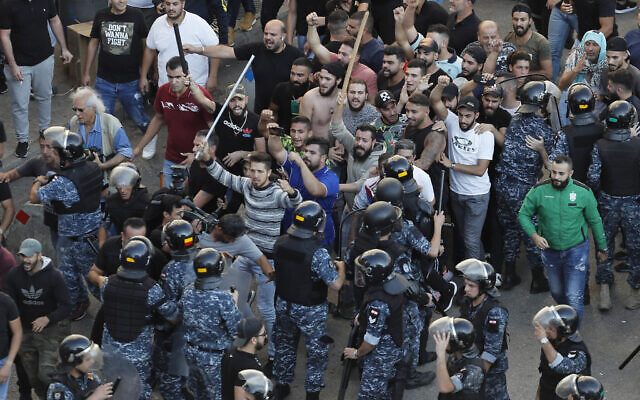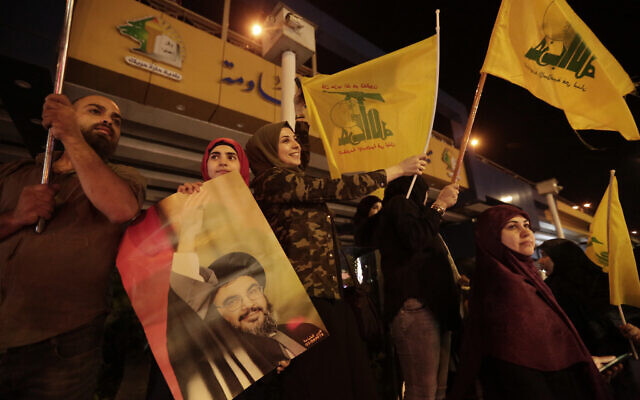Riot police and soldiers try and keep young men, armed with clubs and metal rods and chanting pro-Hezbollah slogans, from reaching demonstrators in central Beirut

BEIRUT — Supporters of the Hezbollah terror group have attacked demonstrators protesting against Lebanon’s political elite in central Beirut.
The attacks by young men armed with clubs and metal rods chanting pro-Hezbollah slogans began late Sunday and continued after midnight as riot police and soldiers tried to prevent them from reaching the protesters.
The attacks occurred after protesters blocked a major road that links eastern neighborhoods of the capital with western parts.
They shouted insults and chanted in support of the chiefs of the Shiite movements Hezbollah and Amal, before briefly breaking through and attacking some demonstrators.
Those at the roadblock chanted “peaceful, peaceful”, as the security forces and army reinforcements deployed in a thick line between both sides in the early hours of Monday morning.
Late Sunday protesters closed major roads near Beirut and in the eastern Bekaa Valley.
Protesters are chanting « Hezbollah are terrorists! » at the Hezbollah supporters on the other side of the police line.
Its about time we say things as they are! #لبنان_يتنفض #LebaneseRevolution pic.twitter.com/UGFXFAVaI5— Romy (@romyjournalist) Nobyembre 24, 2019
The demonstrations began Oct. 17 against proposed taxes on WhatsApp calls but turned into a condemnation of the political elite who have run the country since the 1975-90 civil war. Protesters blame them for years of corruption and mismanagement.
Young people have been at the forefront of the leaderless protest movement, facing a plunging economy and high unemployment and left with few options other than emigrating. The protesters call for a new government and elections outside of the traditional sectarian-based power-sharing agreement.
The top political leaders have been deadlocked over forming a new government since the Western-backed prime minister, Saad Hariri, resigned on Oct. 29.
Video 2:
Hundreds of Hezbollah/Amal supporters head towards #Lebanon protesters on their motor bikes pic.twitter.com/iC4vY3bZwM— Firas Maksad (@FirasMaksad) Nobyembre 24, 2019
Hariri said he has hit a dead-end with his partners in the government, dominated by the Iran-backed Hezbollah, and has called for an apolitical emergency government. His rivals in the president’s party and its ally Hezbollah want to preserve their electoral wins and Hariri, as the face acceptable to the world.
The two sides have sparred publicly. Hariri said the party of President Michel Aoun is acting “irresponsibly” while Aoun’s group said the acting prime minister is holding the Cabinet hostage: “either me or no one else.”
Late Thursday, Aoun said in a televised address that a consensus on forming a government remained far off because of “contradictions that control Lebanese politics.” He didn’t elaborate.
Iranian-backed Hezbollah built a reputation among supporters as a champion of the poor and a defender of Lebanon against Israel. It and its Shiite ally, the Amal party, have enjoyed overwhelming backing among the Shiite community since the end of the 1975-1990 civil war, making them a political powerhouse that, along with allies, has dominated recent governments.
But now many protesters are grouping Hezbollah into the ruling class they are revolting against, blaming it for wrecking the economy with years of corruption and mismanagement.

Protesters want that entire political elite out. Hezbollah’s leader, Hassan Nasrallah, and Amal’s chief, Parliament Speaker Nabih Berri, have not been spared.
“All of them means all of them, and Nasrallah is one of them,” protesters have chanted at some Beirut rallies.
In several instances, men suspected of being Hezbollah and Amal supporters beat up protesters and destroyed their tents. Some of those who had criticized Nasrallah and Berri on social media appeared in videos, after apparently being beaten, to apologize for what they did.
Amal denied any link to those behind the beatings, saying in a statement that they should be arrested and that they violated the movement’s belief in freedom of opinion.
Hezbollah has survived many threats over the past years, including charges by a U.N.-backed tribunal for the killing of former Prime Minister Rafik Hariri in February 2005 — an accusation Hezbollah strongly denies — a ruinous war with Israel in 2006 and the war in neighboring Syria, where Hezbollah has sent thousands of fighters to back President Bashar Assad, losing an estimated 2,000 men.
As reported by The Times of Israel
